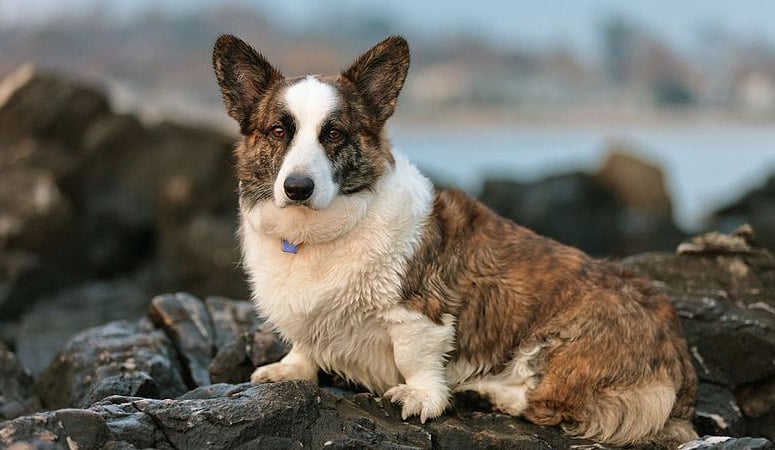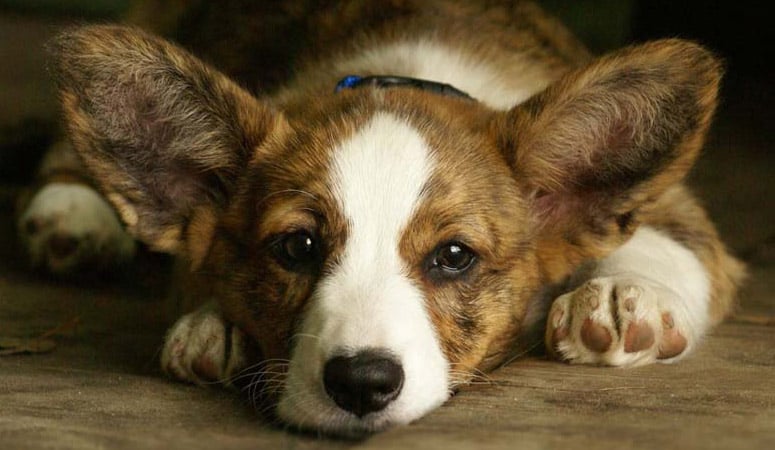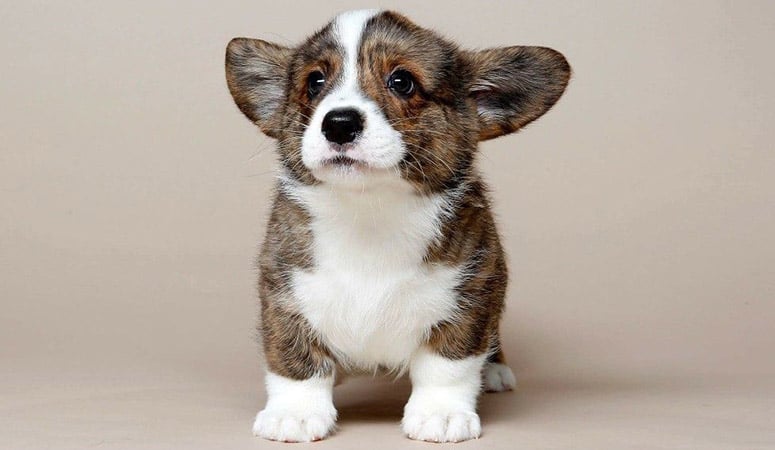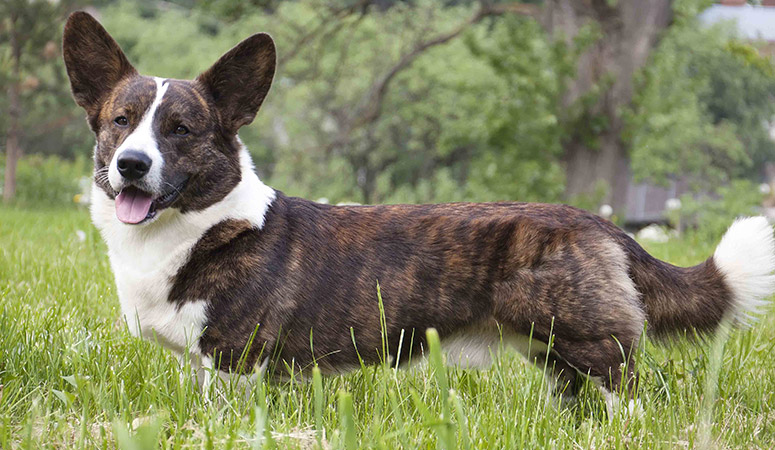Cardigan Welsh Corgi
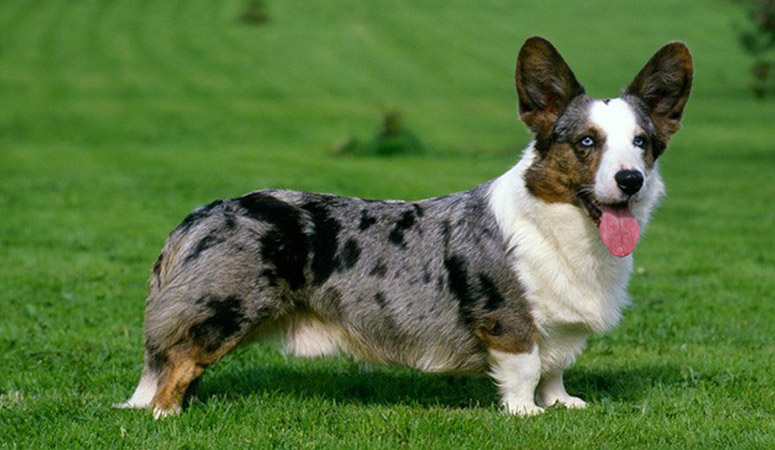
The Cardigan Welsh Corgi is the older of the two Corgi dog breeds, originated in Wales around 1200 BC. They are small but powerful dogs with the agility, speed, and endurance needed to drive cattle for a long time. Lastly, the cattle driving skills were shifted to the duty of a guard dog, where the devoted Corgi became an outstanding protector of the house and family.
| Other Names | Cardi, Cardiagan Corgi, Cardigan, Cardigan Corgi, Welsh Cardigan, Welsh Cardigan Corgi |
| Color | Black, Black and Tan, Blue, Brindle, Gray, Red |
| Height | Males: 10-13 inches. Females: 10-13 inches. |
| Weight | Males: 30-38 pounds. Females: 25-34 pounds. |
| Life Span | 12-15 years |
| Personality | Affectionate, Loyal, Smart |
| Exercise | Energetic |
| Origin |
| Popularity | #66 |
| Groom Needs | Weekly |
| Kids Friendly | Yes with supervision |
| Dog Friendly | Yes with supervision |
| Watch Dog | |
| Family Dog | Yes |
| Litter Size | 4-6 |
Cardigan Welsh Corgi Pictures
Cardigan Welsh Corgi Video
Introduction
Classed under the herding dog group by the American Kennel Club, the Cardigan Welsh Corgi (Cardigan or Cardi for short), is a miniature dog of strong, short legs and incredible power. They are intelligent working dogs with all the makings of an excellent herd dog, although they easily double as loyal and lovable companions. The Cardi, like its Pembroke cousin, comes in a variety of coat colors, from red to blue-merle, but unlike its cousin, the Cardi has a tail hanging around its hindquarters.
Being a small-sized dog, a standard male Cardigan stands to a height of 10-13 inches from paw to shoulder, likewise the female. A full-grown male weighs somewhere between 30 and 40 pounds, while a similar female weighs around 25-35 pounds. They are loyal and endearing dogs. Cardigan Welsh Corgis have an average life expectancy of 11-15 years and are ranked 68th most popular dog breed in America by the American Kennel Club.
Living with Cardigan Welsh Corgi
The Cardigan Welsh Corgi has a double coat, the undercoat is short, and the outer coat is long and thick. They shed a lot, but it could repel dirt, lacks an odor, and is easy to maintain. Brushing a few times per week, and more frequent during seasonal shedding, the regular brushing would help keep the stray hair under control. And bath your dog as needed.
Check their ears weekly for redness or a bad odor that may indicate an infection, and clean with a gentle cleanser. Brush your dog’s teeth at least two or three times a week to remove tartar buildup and the bacteria that lurk inside it, and daily brushing is better to keep fresh breathe and prevent gum disease. Trimming nails regularly will help prevent painful splitting, cracking, or breaking a nail.
The Cardigan Welsh Corgi needs daily exercise in the form of a walk or training for a dog sport such as agility. Moderate exercise several times per day would help prevent boredom and destructive behaviors. The dog benefits from alternative activities to keep things fresh and interesting. And Corgis thrive on regular socialization, so take your dog for walks around the neighborhood is important for many aspects. It could provide fun both you and the dog, as well as the needed exercise. If the dog gets enough exercise, it would be happy in any environment, from apartment to country. Importantly, remember to avoid lumping and stairs which may cause back injury to your dog.
Generally, it is recommended to feed a Cardigan Welsh Corgi with one and a half to two cups of high-quality dry dog food every day, divided into two meals. More importantly, the food amount should depend on the dog’s weight, size, age, and activity level. There should be fresh and clean water at all times.
Some dogs are easy to get overweight, so you need to watch their calorie consumption and weight level all the time. Treats may be an important aid in training, but excessive intake can lead to obesity. Also, owners need to distinguish which human food is safe for dogs and which are not. If you have any problems with your dog’s weight or diet, just consult from your veterinarian.
The Cardigan Welsh Corgis are prone to the following health conditions: hip dysplasia, herniated spinal discs and other disc conditions, eye conditions, including cataracts, progressive retinal atrophy (PRA), and retinal dysplasia, arthritis, especially in overweight Corgis, obesity, etc.
Major concerns: CHD
Minor concerns: degenerative myelopathy
Occasionally seen: urinary stones, PRA
Suggested tests:
Hip Evaluation
PRA Genetic Test
Degenerative Myelopathy DNA Test
Total Annual Cost: $2674
Cost is estimated for the first year and may vary depending on many factors, such as dog food, health care, leash, collar, licensing, possible fencing, crates, training and obedience classes, dog-walking, grooming, treats, toys, flea, tick, and heart-worm meds, microchips, etc.
The intelligent and responsive Cardigan Welsh Corgi could learn basic training with ease. But, it doesn’t mean they are cooperating when training. With their intelligence comes a stubborn streak and the potential for manipulative behaviors. So it is recommended to use consistency and varied training routine to keep the Corgi on its best behaviors.
They enjoy learning and competing in agility, also, they can learn advanced tricks and obedience easily. Cardigan Welsh Corgis could excel in performance and companion activities such as earthdog, barn hunt, agility, and obedience.
Puppies should be properly socialized to develop the amiable, outgoing personality that is characteristic of the breed.
History
The Cardigan Welsh Corgis and their Pembroke cousins have an intertwined origin. All Corgis are believed to have originated from Wales. The word ‘Corgi’ is an old Celtic word for dog. Some historians believe that Corgis were brought from Central Europe to Wales by some itinerant Celts around the 13th Century. The two Corgi breeds were named for the regions which are associated with their development; the Cardigan Welsh Corgi being from Cardiganshire, while the Pembroke Welsh Corgi developed in Pembrokeshire, all in Wales.
The Corgis are accepted as one of the oldest dog breeds of the United Kingdom, having a Welsh history more than 1000 years old. There is disagreement amongst authorities as to the ancestry of the Corgis– while some claim that the Corgi is an offshoot of the Nordic and Spitz dog types, others maintain that the Corgi had emerged from the Teckel family. However, what is clear is that Corgis are veteran farm dogs, they were herd dogs in old Wales, where they herded stock to the markets and to distant pastureland.
The Cardigan and Pembroke were regarded as one breed, “Welsh Corgis”, not until the 1920s when breeders began to work on the looks of the Corgi dogs. Both types began to show some divergence over the years and by 1928, they were distinct enough to be regarded as two varieties of the same dog breed. In 1934, however, the Cardigan Welsh Corgi and Pembroke Welsh Corgi were separated as two different dog breeds in the United Kingdom. The American Kennel Club recognized the Cardigan breed in 1935, four years after the breed was imported into the United States.
Helpful Information
Breed Club: CARDIGAN WELSH CORGI CLUB OF AMERICA, INC.
Breed Club Link: https://www.cardigancorgis.com/
Breed Club Rescue: Cardigan Welsh Corgi National Rescue Trust (CWCNRT)
Breed Club Rescue Link: https://cardiganrescue.org/

